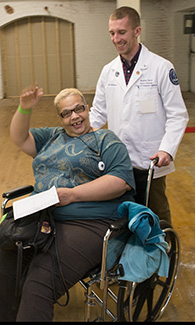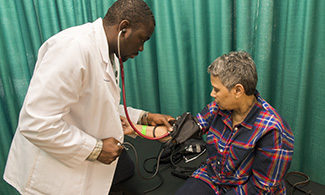Wednesday, October 28, 2015
Wed, 28 Oct 2015 | Shelley Andrews | LUCOM Marketing and PR
While most of medical school consists of lectures, exams, labs and hours of studying, at Liberty University College of Osteopathic Medicine (LUCOM) serving the underserved is also considered a crucial part of a student doctor’s educational path.
 On October 24, a team of student-doctors, faculty and administrative staff traveled to Martinsville for LUCOM’s first domestic Medical Outreach event.
On October 24, a team of student-doctors, faculty and administrative staff traveled to Martinsville for LUCOM’s first domestic Medical Outreach event.
“It is easy to get in survival mode in medical school. It is hard work and very demanding. The opportunity to see patients, to feel that you have made a difference in the lives of patients, is important to maintain the empathy, compassion, humanism and servant heart that we all seek in our physicians,” said Ronnie Martin, D.O., LUCOM Dean.
During the six-hour health clinic, student-doctors and physicians provided general health screenings for dozens of individuals in a patient-centered atmosphere. They focused on issues like obesity and diabetes, hypertension and heart disease, and musculoskeletal pain and dysfunction, including the application of Osteopathic Manipulative Medicine (OMM).
The event was a joint partnership with numerous other agencies in the region. Students from the Lynchburg College Physician Assistant Medicine program assisted student-doctors and helped with the intake process for patients. Other non-profits, like Piedmont Access to Health Service (PATHS), helped follow up with patients after their visits, a part of the process Dr. Martin says is critical.
“It is our goal to help expand access to primary health care for the citizens of the region by working with the local agencies that are already in place and doing good work,” said Dr. Martin. “It is important that we do so to ensure that when we find disease or abnormalities, there is a place for the patient to follow up and maintain care.”
From chronic arm pain to high blood pressure, LUCOM faculty members were very impressed with how the student-doctors cared for each patient’s specific needs.
“Some of the student-doctors were very confident, others were nervous, but all of them treated each other and their patients with the utmost respect and professionalism, the way God would want all of His children to be treated,” said Carl Hoegerl, D.O., LUCOM assistant professor of neurology.
“I was amazed at their maturity and great attitudes. They are growing into doctors who are humble and have a servant’s heart,” said Kathy Bogacz, M.D., LUCOM assistant professor in the Department of Internal Medicine.
 Student-doctor Lawrenshey Charles, class of 2018, called the experience in Martinsville “humbling.”
Student-doctor Lawrenshey Charles, class of 2018, called the experience in Martinsville “humbling.”
“It really puts into perspective why we spend so many hours in the classroom, library, and studying. The pathophysiology that we learn about are real, and they translate to real human beings,” said Charles.
One of the first patients to walk through the doors ended up in student-doctor Lily Daniel’s booth. She says she learned a lot from the young man who had a fractured hand that had not healed properly. He told her he could not afford to go to physical therapy or have surgery so her attending physician, Dr. Gregg Albers, gave the patient some ways to improve hand function at home.
“It really reminded me to assess a patient’s ability to pay for a certain treatment or medicine before prescribing it and be sure to provide them with alternatives if necessary, said Daniel. “He was only my age, and it was so sad to see someone so young lose function in any body part, but especially something as important as your hand, almost solely due to inability to afford treatment.”
Her patient’s story is very similar to a large portion of the population in Martinsville. The city’s unemployment rate has hovered near 10% for the past year and reached a peak of 19.3% in 2009, according to the Virginia Employment Commission.
“Many in the area are medically underinsured or uninsured, and the Health Resource Shortage Area designates Martinsville as an area with too few primary care providers,” said James Cook, LUCOM director of medical outreach. “In Virginia, it is one of the areas with the greatest needs.”
But LUCOM wants to change those statistics and has a vision for medically underserved areas of Southern and Southwest Virginia. Not only will outreach clinics improve access to health care in the short term, but the event also connects the student-doctors to the region, leading to long-term change in the area’s health care system.
“Research shows that a large percentage of student-doctors will later serve in a rural and underserved location if they were involved in the area. Our desire is to have student-doctors return to practice medicine in Martinsville,” said Cook.
Daniel’s experience in Martinsville is proof of that. She found a connection with the Martinsville community immediately and cannot wait to return.
“To be able to get out in the community for the first time and demonstrate what we are all about was a wonderful feeling. Actions speak louder than words, and I think our actions in Martinsville spoke volumes about who we are as a university,” said Daniel. “We are here to learn, to serve, and to improve the lives of those in Lynchburg and the surrounding areas to the best of our ability.”
—-

Other partners for the outreach event included: the City of Martinsville, Coalition of Health and Wellness MHC, The Rotary Club – Martinsville, Grace Network, Crisis Pregnancy Center, Wal-Mart Pharmacy, The Lester Group, Chick-Fil-A, TRBC and Nuevo Amanecer.